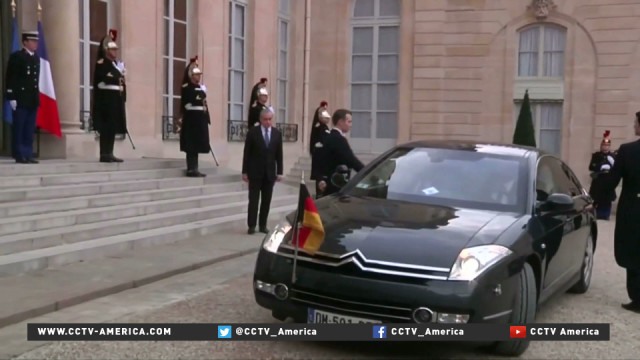German Chancellor Angela Merkel arrives in China in a few hours. It’s expected to be a business-focused trip for the leader of Europe’s largest economy, at a time when the continent’s recovery still looks fragile.
With the Chinese economy slowing down, some see Germany as particularly vulnerable. Nearly half of all European Union exports to China are German. This state visit is about boosting that figure.
In the past, state visits by western leaders were often overshadowed by sharp disagreements over civil liberties. Now the focus is business.
It’s not just Europe’s major capitals queuing up to woo Chinese investment, but also smaller, regional centers like Magdeburg.
Magdeburg once was a decaying industrial heartland but now is home to 6 thousand small and medium-sized businesses. It’s a re-invention with a Chinese focus, and some officials have even learned Mandarin because they want to welcome hundreds of native-speakers annually.
Some worry about China’s economic slowdown, particularly in Germany’s export-driven economy. However, global trade experts view it as a short-term problem.
CCTV’s Guy Henderson reports from Berlin.
Follow Guy Henderson on Twitter @guyhendersonde

Ansgar Graw on Merkel’s visit to China
CCTV America spoke with Ansgar Graw.
He’s senior Washington correspondent for the German newspaper Die Welt.

China and Germany cooperate towards industrial innovation
The Chinese leadership and the German government have decided to cooperate in industrial innovation, since Germany is China’s number-one trading partner in the EU.
Bilateral trade between China and Germany increased by more than 11 percent last year despite China’s economic slowdown. The German government has pledged to promote the computerization of manufacturing and to help revolutionize the way goods are produced, calling the advancement “Industry 4.0” .
China is a manufacturing hub. However, for German companies, China is not a low-cost manufacturing country. It is more important to find skilled laborers to progress in manufacturing while focusing on research and development and on the local market in China.
And this future appears to involve innovative Chinese cars with a dash of German design. German auto-maker Daimler has invested heavily in new products fit for China, specially designed for Chinese’s needs.
More details:
- China is now the second-largest market for German exports outside the EU.
- Overall car sales in China halved to 7% in 2014, but German auto-maker Daimler is bucking the trend with a 29-percent surge in orders for Mercedes last year.
- Autonomous driving is seen as the tendency and development for future innovative technologies.
CCTV’s Wang Tongxuan reports from Beijing.

 CGTN America
CGTN America German Chancellor’s State visit to boost Chinese investment
German Chancellor’s State visit to boost Chinese investment
